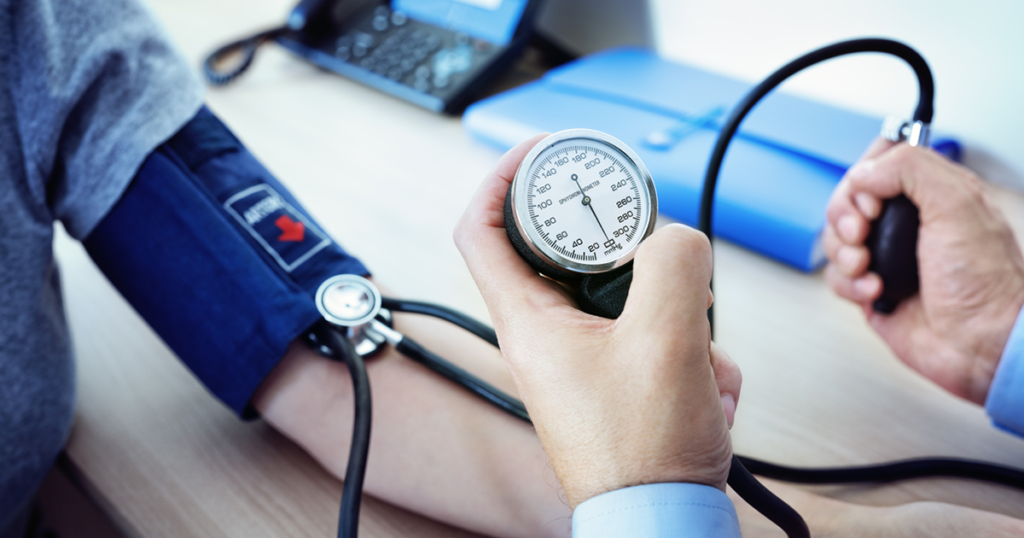
High blood pressure, known as hypertension, A persistently elevated arterial pressure is called hypertension. It is serious if left untreated. hypertension usually does not have any symptoms.
How do measure blood pressure?
Blood pressure is usually measured with a device known as a sphygmomanometer. They typically consist of a rubber cuff that is applied to the arm, connected to a mercury meter and a manual pump. Automatic devices with sensors and digital displays are also used nowadays. Blood pressure is measured in 2 numbers. The upper number is systolic pressure. It is the force at which your heart pumps blood towards your body. The lower number is the diastolic pressure. It is the resistance to the blood flow in the blood vessels. Its measuring unit is in millimetres of mercury (mmHg).
What is healthy or normal blood pressure?
Your blood pressure should be above 90/60 mmHg and under 140/90 mmHg. Ideal blood pressure is usually between 90/60mmHg and 120/80mmHg. Blood pressure readings between 120/80mmHg and 140/90mmHg mean you are at risk of developing high blood pressure. So be careful and conscious to keep your blood pressure under control.
Low
- Systolic: lower than 90 mmHg
- Diastolic: lower than 60 mmHg
Normal
- Systolic: lower than 140 mmHg
- Diastolic: lower than 90 mmHg
Possible hypertension
- Systolic: between 140 and 180 mmHg
- Diastolic: between 90 and 110 mmHg
Severe hypertension
- Systolic: higher than 180 mmHg
- Diastolic: higher than 110 mmHg
Types of High blood pressure
There are two types of hypertension.
Primary (essential) hypertension
There is no known cause of high blood pressure. This type of high blood pressure is known as primary (essential) hypertension. It develops gradually over the years.
Secondary hypertension
High blood pressure with an underlying condition is called secondary hypertension, tends to appear suddenly, and causes more severe hypertension than primary hypertension. Many conditions and medications can lead to secondary hypertension, including:
- Obstructive sleep apnea
- Kidney disease
- Adrenal gland tumors
- Thyroid problems
- Born with certain congenital defects in blood vessels
Symptoms of Hypertension
Mild hypertension symptoms can include early morning headaches, epistaxis, arrhythmic heartbeat, vision impairment, and noises in the ears. Severe hypertension may cause fatigue, nausea, vomiting, confusion, anxiety, chest pain, and muscle tremors. If left untreated, it can cause persistent chest pain (angina), heart attacks, heart failure, and arrhythmia, which can lead to sudden death.
Severe hypertension can cause strokes by blocking or bursting arteries in the brain, as well as kidney damage, which can lead to kidney failure.
Risk factors for hypertension
There are two types of risk factors for high blood pressure
1: Modifiable risk factors
The best way to prevent hypertension and associated diseases of the brain, heart, kidney, and other organs is to focus on modifiable risk factors that include
- Excessive salt consumption.
- A diet high in saturated fat.
- low intake of fruits and vegetables.
- Physical inactivity, lack of exercise.
- Consumption of tobacco and alcohol.
- Overweight or obese.
2: non-modifiable risk factors
- Family history of hypertension,
- Age over 65 years
- Diabetes
- Kidney disease.
Avoiding dietary and behavioral risk factors is doubly important for those with non-modifiable or hereditary risk factors.
How to manage hypertension
Hypertension can be managed by reducing mental stress, regularly checking blood pressure and consulting with health professionals, treating high blood pressure, and managing other medical conditions. Stop using tobacco and reduce the use of alcohol, as well as improvements in diet and exercise, can help reduce symptoms and risk factors from hypertension.
How to treat high blood pressure
Your health professionals can help you to keep your blood pressure at a safe level. With changes in lifestyle and advising medicines.
- Less use of salt
- Use fresh fruit and vegetable
- Eat a low-fat, balanced diet
- Cut down on alcohol
- Lose weight if you’re overweight
- Regular exercise
- Less use of caffeine
- Do not smoke
Some people with high blood pressure may also need medicines to control their blood pressure